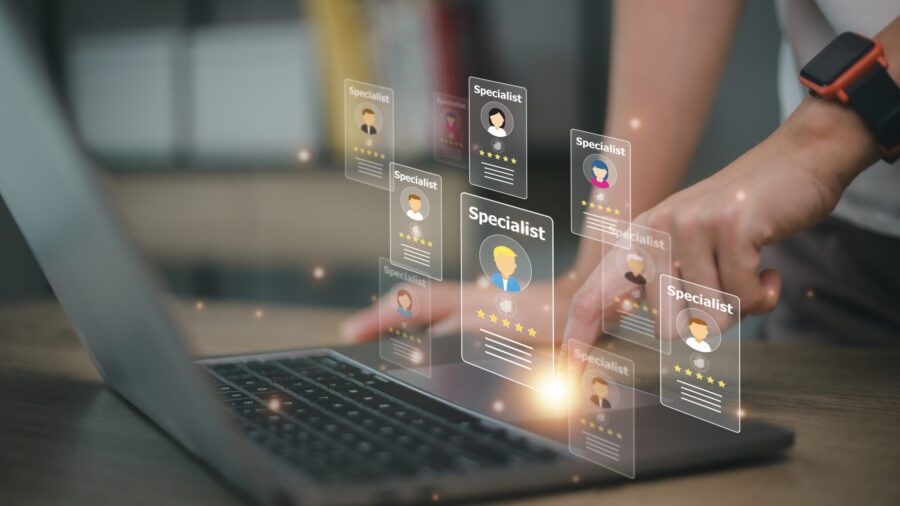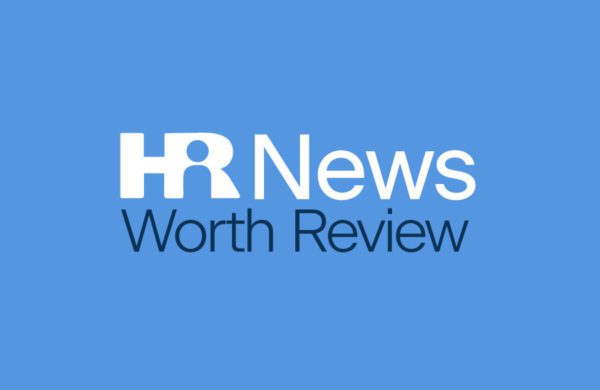The rapid advancement of artificial intelligence technology is defining a new workplace, transforming the outlook for many traditional jobs and challenging human resources professionals to harness the power of generative AI for both workforce development and strategic competitive advantage.
In this article, we will look at the emerging role of artificial intelligence in HR practices, including examples of how both corporate and small business HR professionals are implementing AI-powered solutions across the full range of human resources services.
AI in HR: Transforming Human Resource Management
According to Gartner, 81 percent of HR leaders are exploring or implementing AI solutions to handle administrative tasks, improve efficiency and drive employee engagement. When it comes to artificial intelligence in HR management, professionals should expect to see the technology tools currently being used by HR departments becoming updated to include the latest generative AI-powered features and functions, such as machine learning, natural language processing (NLP), chatbots, virtual assistants and large data analysis.
Artificial intelligence in HR management tools is transforming every service provided by HR departments, including recruitment, talent acquisition, training, employee engagement, benefits administration, compliance, diversity and inclusion, performance management and data-driven decision-making. Let’s take a closer look at the impact of artificial intelligence on these essential HR processes.
AI in HR: The Recruitment Process
Recruiting has traditionally been one of the most time-consuming and resource-intensive functions of a company’s HR department. Not long ago, a typical employment ad could expect to receive responses that were, on average, only about 10 percent relevant to the job posting. Artificial intelligence has been a game-changer, helping streamline recruiting and enhance the candidate experience.
AI-powered recruitment tools can help companies write job descriptions, analyze resumes, sort job applications and filter social media profiles to identify the most suitable candidates. AI can also help HR departments avoid bias and facilitate a hiring process that is both more efficient and more inclusive.
AI Assistants on the Recruiting Team
Should you consider the importance of artificial intelligence in HR? Consider that AI chatbots enable real-time communication with candidates, immediately responding to queries, scheduling interviews and providing application status updates, all while freeing HR departments to focus on higher-priority tasks. Interviewers can leverage natural language processing (NLP) to evaluate a candidate’s language and grammar. AI-powered video interviews can analyze facial expressions and body language, providing HR departments with valuable insights into candidate suitability.
With a defined training path, AI can also deliver lectures, display examples, ask questions and record answers of potential hires. If this training is not going well, AI chatbots and virtual trainers are capable of summoning human HR intervention to resolve issues and keep the process on track.
AI-Powered Talent Acquisition
Until recently, talent acquisition required HR teams to process stacks of irrelevant applications in order to find a few qualified candidates, and then screen those candidates for any negative history, follow up with references and conduct in-person interviews.
With the help of artificial intelligence, the most time-consuming recruiting tasks can now be handled by AI-powered tools. AI algorithms can quickly process hundreds of resumes, comparing skills and experiences to a job description, an ideal candidate or the best-performing employees in the company database. Unsuccessful candidates can receive a polite reply declining further consideration.
AI Support Throughout the Hiring Process
With initial candidates identified, AI-powered chatbots can ask for follow-up details, answer queries and handle other routine communications while HR professionals are able to focus on higher-priority tasks. AI can take identified candidates almost to the end of the hiring process with background checks, skills testing and personality assessment screenings.
Supported by a wider search, faster results and more refined screening, HR professionals armed with AI-powered tools are poised to consistently beat out their competitors in recruiting the best talent.
AI in HR: Enhancing the Onboarding Experience
Many bad hires are the result of inept onboarding. However, an effective onboarding experience can help ensure that new employees will enthusiastically pursue their new role, responding to the company’s efforts to increase engagement, remaining with the company longer and recommending the company to their peers.
With data on new hires, and from other employees who perform well in the same or a similar role, artificial intelligence can create a personalized onboarding experience, helping new hires adjust smoothly to their new position, learn job requirements and know where to look for help when needed.
With the results of skills testing, AI can recommend a training path, link a new hire to key contacts, provide a company library of resources, lay out a roadmap covering benefits and policies and provide access to any other resources that will help the new hire slip seamlessly into the role.
AI in HR: Personalized Training
Rather than having all new hires follow a standard training gantlet, risking the employee’s boredom or incomprehension, artificial intelligence provides HR with the ability to evaluate each employee and to develop a customized training path based on skills and experience.
Every employee has strengths and weaknesses, and every employee has relevant skills acquired throughout work history. At the same time, every job has unique requirements and desired results. AI-powered tools can support employee training and development based on the entire performance equation, evaluating the strengths, weaknesses, skills and prior experiences of the employee, as well as the demands of the job and the examples of other employees who have delivered high performance in the same role.
AI Support for Employee Engagement
Employee engagement has become a cornerstone of organizational success, impacting productivity, retention and overall well-being. AI tools enable HR leaders to gauge employee sentiment through analysis of communication channels, surveys and employee feedback forms.
By pursuing a data-driven approach to employee engagement, HR professionals can analyze and better understand workforce concerns, allowing them to proactively address issues and create an environment that fosters greater engagement.
Engagement Equals Job Satisfaction
With employee engagement linked closely to job satisfaction and career development, human resources teams can use new AI algorithms to analyze worker performance data to uncover skill gaps, recommend customized employee training modules and focus on career growth opportunities. Chatbots can also reduce worker frustrations by providing employees with instant answers to questions and easy access to policy information.
AI in HR: Safeguarding the Human Investment
When an employee leaves for another position, substantial investments by both the company and the employee are simply lost. Managers often wonder what would have happened if a disengaged employee had reached out to human resources to have the issues resolved.
Artificial intelligence can identify workers who are disengaging before it’s too late. By tracking computer activity, including changes in behavior or level of activity, AI can alert HR to a worker who is becoming disengaged, unproductive or even seeking another job. If the issues can be resolved, the employee can be retained and the investments of both the employee and the company can be preserved and improved upon. If issues cannot be resolved, the matter can be brought to light and action can be taken.
AI in HR: Benefits Administration
With basic employee information, such as number of dependents or known health conditions, artificial intelligence can help HR leaders design an optimal employee benefits plan. The AI-powered recommendation engine can generate overall plans as well as assessments of specific situations.
Q&A sessions with an AI chatbot can help employees evaluate the value and relevance of 401(k) plans, health savings accounts, insurance coverage options and tax situations. With recommendation support powered by artificial intelligence, the benefits administrator can create estimates of coverage cost, streamline the enrollment process and avoid mistakes.
Better Enrollment and Wellness Decisions
Artificial intelligence can analyze employee data to help benefit administrators make better recommendations to employees and to help employees make better benefits enrollment and wellness decisions. AI helps HR departments process standard enrollments and perform other HR processes quickly and accurately, freeing the HR team from performing repetitive tasks and allowing them to focus on strategy and performance improvement while also providing human interaction with employees as required.
AI in HR: Diversity and Inclusion
Artificial intelligence can be deployed to reduce bias through algorithms that help ensure that language remains inclusive in communications with a diverse pool of candidates. While it is difficult to identify and eliminate human bias, AI-powered assessment platforms can be monitored, audited and improved. AI tools can also help organizations track and monitor D&I metrics, allowing for greater progress and accountability in creating a diverse workplace.
Compliance With Employment Law
AI tools have become very valuable to the entire recruiting process by helping HR teams remain compliant with state and federal laws governing equal employment. Artificial intelligence has no inherent or cultural bias. However, AI can be taught to recognize bias in job descriptions, job postings, search criteria, background screening, skill tests, personality assessments and other communications.
HR professionals can increasingly rely on artificial intelligence tools to support their efforts to remain free of bias in hiring, helping their organization avoid problems with legal compliance and to work toward a more diverse and inclusive workplace.
AI in HR: Performance Management
Traditional performance reviews often fall short of providing real-time feedback and fostering continuous improvement. AI-powered performance management systems help HR teams track employee achievements, KPIs and milestones, offering timely insights for feedback and recognition.
These systems can also identify skill gaps and recommend training based on the employee’s current work results and metrics as compared with the company’s best performers.
Data-Driven Decisions
With the abundance of data generated by today’s enterprises, there is no excuse for an inability to make data-driven decisions. AI enables HR professionals to develop strategies for performance, engagement and other essential HR metrics based on hard evidence.
AI predictive analytics can identify patterns in employee behavior, helping HR professionals forecast attrition rates, anticipate skill gaps and design succession plans. Strategies for competitive compensation and benefits can also benefit from artificial intelligence.
Along with their ability to analyze employee data, machine learning algorithms can analyze market trends, industry benchmarks and employee performance to recommend competitive packages and to help ensure fair, equitable and competitive remuneration.
New Ethical Considerations
The ethical challenges arising from AI applications deserve careful consideration. HR professionals must navigate the potential shortcomings of AI algorithms and respect employee data privacy and personal autonomy when using features like workstation monitoring and data-driven decision-making. In order to maintain trust and integrity in HR practices, AI implementation must be transparent and accountable when it comes to protecting employee rights.
What the Near Future Holds
As artificial intelligence continues to evolve, human resource teams can expect rapid advancements and applications of AI technologies, such as natural language processing and sentiment analysis, providing HR professionals with new tools to anticipate and address worker concerns.
Virtual and augmented reality technologies will facilitate immersive onboarding experiences, skills testing and remote training initiatives and will overcome geographic barriers to allow for timely employee feedback, effective mentoring and improved delivery of the entire human-powered HR service system.
Revolutionizing HR Departments
Artificial intelligence may replace some traditional jobs, but it will also enhance the speed, accuracy and overall impact of many positions. In the practice of human resources, artificial intelligence will enable HR teams to work with a multi-dimensional picture of their entire workforce, while at the same time allowing HR professionals to see more deeply into the potential that each employee brings to his or her work. HR leaders who step forward to embrace new technologies will find their workers more engaged, their objectives more ambitious and their organizations more competitive.
Human resources can be complicated, especially with the constant evolution of HR technologies. But, Higginbotham’s HR Services team is here to help your business grow and to turn your uncertainties into opportunities, whether that’s through HR outsourcing, payroll services, HR consulting or more specific services. Talk to one of Higginbotham’s HR specialists today.








